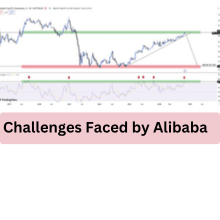
Alibaba Group Holding Limited (NYSE: BABA), the e-commerce giant founded by Jack Ma, continues to show resilience in the face of economic headwinds. Despite a few setbacks, the company’s Q2 fiscal 2024 earnings report presents a mixed but promising outlook. With strong revenue growth in its international and cloud sectors, Alibaba is strategically positioning itself for future success, even as challenges persist in the Chinese market. Let’s dive into the details of Alibaba’s performance in Q2, highlighting key takeaways, financial results, and what investors can expect in the months ahead.
Alibaba’s Strong Revenue Performance
Alibaba reported a solid 5% year-on-year growth in revenue for the fiscal second quarter of 2024, amounting to $33.7 billion. This surpassed the analyst consensus estimate of $33.47 billion, which was a positive surprise for investors. Despite facing challenges in its home market, particularly with sluggish consumer spending, Alibaba’s diversified business model has helped it maintain steady growth.
The company’s revenue growth is a testament to its ability to adapt and find opportunities across different sectors. Alibaba’s e-commerce platforms, international digital commerce operations, and cloud computing business are all performing well, with notable contributions from cross-border sales and cloud services.
Profit and Earnings Performance
While Alibaba exceeded expectations on revenue, its adjusted earnings per ADS of $2.15 missed the consensus estimate of $2.26. The company’s adjusted net income declined by 9% year-over-year, amounting to $5.20 billion. Despite this, Alibaba’s profit performance is worth noting, as net income saw a 58% increase compared to the same period last year, reaching 43.9 billion yuan ($6.07 billion). This boost was largely driven by gains from equity investments, as the company saw significant growth in its financial portfolio.
The increase in profit was due to several factors, including improved operational performance, fewer impairment charges on investments, and the growth of Alibaba’s core business units. The slight decline in adjusted net income is a reminder that Alibaba is still navigating through the complexities of the current global economic environment.
Alibaba’s Core Business Segments
Taobao and Tmall Group Performance Taobao and Tmall Group, Alibaba’s flagship e-commerce platforms in China, saw a modest 1% year-over-year revenue growth, generating $14.11 billion in the quarter. This growth came primarily from increased customer management revenue, which grew 2% due to a rise in online GMV (Gross Merchandise Volume). Despite facing challenges in the Chinese retail environment, Alibaba’s ability to maintain stable growth in this key segment shows the strength of its e-commerce foundation.
International Digital Commerce Group Growth One of the standout performers in Alibaba’s portfolio was its International Digital Commerce Group, which reported a strong 29% year-on-year growth in revenue, amounting to $4.51 billion. This surge was driven by the growth of cross-border businesses, particularly the success of AliExpress’ Choice business. The international expansion has been a significant contributor to Alibaba’s growth, helping to offset the weaker performance of its domestic Chinese operations.
Local Services and Logistics Network Performance Alibaba’s Local Services Group, which includes businesses like Ele.me and Amap, reported a 14% year-on-year growth in revenue, reaching $2.53 billion. This growth was driven by increased order volume and revenue from marketing services. Cainiao Smart Logistics Network, Alibaba’s logistics arm, also performed well, with an 8% increase in revenue, totaling $3.51 billion. The company’s integrated logistics network is essential for its cross-border e-commerce operations, supporting the growth of international sales.
Cloud Business Growth
Alibaba’s Cloud Intelligence Group, which includes its public cloud offerings and AI-related products, saw a 7% increase in revenue to $4.22 billion in Q2. While this is a slower pace than some of the rapid growth observed in previous quarters, it still demonstrates Alibaba’s ability to expand its cloud business amidst fierce competition. The cloud unit has been a significant growth driver for Alibaba, and the company is optimistic about the future of this segment.
Growth in Alibaba’s Cloud business has been particularly strong in AI-related products, which saw triple-digit growth. The company’s cloud services are increasingly positioned to capitalize on the booming AI market, with Alibaba continuing to invest heavily in this area. The strategic push towards AI is a central part of Alibaba’s long-term vision, making its cloud infrastructure and AI technology key pillars of its future growth.
Key Financial Metrics
Alibaba reported a decline in free cash flow, which fell 38% year-over-year to $4.48 billion. This drop in cash flow is attributed to the company’s ongoing strategic investments, particularly in the areas of cloud computing and AI. While free cash flow has decreased, Alibaba’s overall financial health remains strong, with $79 billion in cash and equivalents as of September 30, 2024.
Operating cash flow also saw a decline, down 38% year-on-year. This is reflective of Alibaba’s significant investment in long-term growth initiatives. Despite these declines, Alibaba’s strong liquidity position allows it to continue investing in key areas such as cloud infrastructure, AI, and international expansion, positioning the company for future growth.
Revenue Breakdown by Business Segments
China’s E-Commerce: Retail and Wholesale Alibaba’s revenue from China’s retail e-commerce business remained stable year-over-year, with retail revenue at $13.25 billion. However, revenue from direct sales and other segments declined by 5% to $3.23 billion, mainly due to weaker appliance sales. In contrast, Alibaba’s wholesale business in China grew by 18%, driven by increased value-added services to paying members.
International E-Commerce Growth International e-commerce continues to be a bright spot for Alibaba, with international commerce retail revenue growing by 35% year-on-year, reaching $3.65 billion. This growth was mainly driven by AliExpress and Trendyol. Alibaba’s international operations, particularly in Southeast Asia, are becoming increasingly important as the company diversifies its revenue streams and expands its global presence.
Performance of Alibaba’s Cloud Business Alibaba’s cloud business continues to grow, albeit at a slower pace compared to earlier periods. The company’s cloud services, including public cloud products, grew by double digits, and AI-related products saw triple-digit growth. This acceleration in cloud and AI-related product sales signals Alibaba’s commitment to becoming a leader in the emerging AI market.
Also read: When Does Spotify Wrapped 2024 Drop? Here’s the Truth
Factors Driving Revenue Growth
Several factors contributed to Alibaba’s revenue growth in Q2. These include:
- AliExpress: The global platform experienced significant growth, particularly through its Choice business, which has been a key driver of international revenue.
- Amap and Ele.me: Both services showed robust growth, driving revenue increases in the local services segment.
- Cross-border Fulfillment: Alibaba’s logistics network, including Cainiao, continues to support the growth of cross-border trade, contributing to the strong performance of international commerce.
Challenges Faced by Alibaba
Despite the growth in certain segments, Alibaba faces several challenges. These include:
- Sluggish Consumer Spending: The overall retail environment in China remains weak, and consumer confidence is low, affecting demand for Alibaba’s products and services.
- Regulatory Issues: Alibaba continues to navigate the regulatory landscape in China, which has imposed restrictions on major tech companies in recent years.
Outlook for the Future
Looking ahead, Alibaba’s future growth will depend heavily on the recovery of the Chinese economy. The company is betting on the success of recent stimulus measures announced by Beijing to boost economic growth. Additionally, Alibaba’s continued investment in cloud infrastructure and AI technology is expected to drive long-term growth.
Alibaba’s ability to adapt to market changes and expand internationally will be crucial in maintaining its position as a global e-commerce leader.
Alibaba’s Role in the AI Market
Alibaba is positioning itself as a key player in the AI space. The company has been heavily investing in AI-related products, including its own AI assistant, Tongyi Qianwen. Alibaba’s cloud services are increasingly focusing on AI, with the company targeting both the Chinese and global markets. As competition in the AI space intensifies, Alibaba’s ability to innovate and build on its cloud infrastructure will determine its future success.
Implications for Investors
For investors, Alibaba’s performance in Q2 indicates that the company is still on a growth trajectory, despite facing challenges. The strong revenue growth in international markets and the cloud segment are promising signs for future performance. However, investors will need to monitor the impact of economic conditions in China and Alibaba’s ability to navigate regulatory changes in the region.
Alibaba’s International Expansion
Alibaba’s expansion into international markets, particularly in Southeast Asia, has been a key driver of growth. The company’s international platforms, including Lazada and AliExpress, saw significant revenue growth, contributing to the overall revenue increase in Q2. This international diversification is critical for Alibaba’s long-term strategy.
Also read: Bad Sisters Season 2: Anne-Marie Duff Teases Shocking Plot Twists
Conclusion
Alibaba’s Q2 2024 earnings report demonstrates both strengths and challenges. While the company exceeded revenue expectations, it faces pressures in the domestic market and the broader economic environment. However, its international and cloud businesses are performing well, and its strategic investments in AI and cloud infrastructure position the company for future growth.
FAQs
-
What drove Alibaba’s revenue growth in Q2 2024?
- Alibaba’s revenue growth was driven by strong performances in its international e-commerce platforms, cloud services, and local services like Ele.me and Amap.
-
Why did Alibaba’s adjusted earnings miss estimates?
- The miss on adjusted earnings was primarily due to higher-than-expected costs related to Alibaba’s ongoing strategic investments, particularly in AI and cloud technology.
-
How did Alibaba’s cloud business perform?
- Alibaba’s cloud business saw 7% growth in Q2, with strong sales in AI-related products and public cloud services.
-
What challenges is Alibaba facing in the Chinese market?
- Alibaba is dealing with sluggish consumer spending, regulatory challenges, and a weaker retail environment in China.
-
What can investors expect from Alibaba in the coming quarters?
- Investors can expect Alibaba to continue focusing on international expansion, cloud growth, and AI investments as key drivers of long-term growth.

